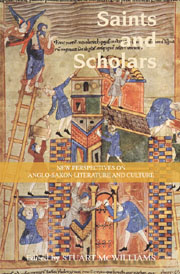 Saints and Scholars
Saints and Scholars Book contents
- Frontmatter
- Contents
- List of Contributors
- Abbreviations
- Introduction
- I Hagiography and the Homiletic Tradition
- 1 A Note on the Sensational Old English Life of St Margaret
- 2 A Place to Weep: Joseph in the Beer-Room and Anglo-Saxon Gestures of Emotion
- 3 Aldhelm's Choice of Saints for his Prose De Virginitate
- 4 Shepherding the Shepherds in the Ways of Pastoral Care: Ælfric and Cambridge University Library, MS Gg.3.28
- 5 “Consider Lazarus”: A Context for Vercelli Homily VII
- 6 More than a Female Joseph: The Sources of the Late-Fifth-Century Passio Sanctae Eugeniae
- 7 Ælfric, Leofric and In Natale Plurimorum Apostolorum
- II Aspects of Community and Consumption
- III Reflections on Old English Scholarship
- Poems
- Hugh Magennis: A Bibliography, 1981–2011
- Index
- Tabula Gratulatoria
2 - A Place to Weep: Joseph in the Beer-Room and Anglo-Saxon Gestures of Emotion
from I - Hagiography and the Homiletic Tradition
Published online by Cambridge University Press: 05 February 2013
- Frontmatter
- Contents
- List of Contributors
- Abbreviations
- Introduction
- I Hagiography and the Homiletic Tradition
- 1 A Note on the Sensational Old English Life of St Margaret
- 2 A Place to Weep: Joseph in the Beer-Room and Anglo-Saxon Gestures of Emotion
- 3 Aldhelm's Choice of Saints for his Prose De Virginitate
- 4 Shepherding the Shepherds in the Ways of Pastoral Care: Ælfric and Cambridge University Library, MS Gg.3.28
- 5 “Consider Lazarus”: A Context for Vercelli Homily VII
- 6 More than a Female Joseph: The Sources of the Late-Fifth-Century Passio Sanctae Eugeniae
- 7 Ælfric, Leofric and In Natale Plurimorum Apostolorum
- II Aspects of Community and Consumption
- III Reflections on Old English Scholarship
- Poems
- Hugh Magennis: A Bibliography, 1981–2011
- Index
- Tabula Gratulatoria
Summary
Where do Anglo-Saxon men go when they want to have a little weep, away from the public eye? Or, more precisely, where would an Anglo-Saxon audience imagine a man of power going when he wanted to conceal his crying? The question touches on some interesting issues for understanding Anglo-Saxon culture. Did real men cry in Anglo-Saxon England? What was the value of tears? Are there constraints of gender and class in displaying emotion? How is the public/private division imagined? Hugh Magennis has looked at the body's emotional expression through laughter in Anglo-Saxon literature; this essay in his honour will examine the body's emotional outpouring through weeping by focusing on a single symptomatic instance. The example occurs in a text that has been largely overlooked by contemporary scholarship, perhaps because it is a translation, although it is a translation with such massive cultural significance that it may well have influenced the gestural repertoire available to Anglo-Saxon men and women: the story of Joseph as told in the Old Testament book of Genesis. Resonating with the moment of weeping at the centre of this essay is a rather peculiar scene of feasting – a subject well elucidated by Magennis's scholarship – which, I will suggest, successfully plays with Anglo-Saxon expectations. Applying a Magennis-like attentiveness to images and gestures within this biblical translation, I will endeavour to open up an understanding of potential gestures of masculinity available in Anglo-Saxon England.
- Type
- Chapter
- Information
- Saints and ScholarsNew Perspectives on Anglo-Saxon Literature and Culture in Honour of Hugh Magennis, pp. 14 - 32Publisher: Boydell & BrewerPrint publication year: 2012


